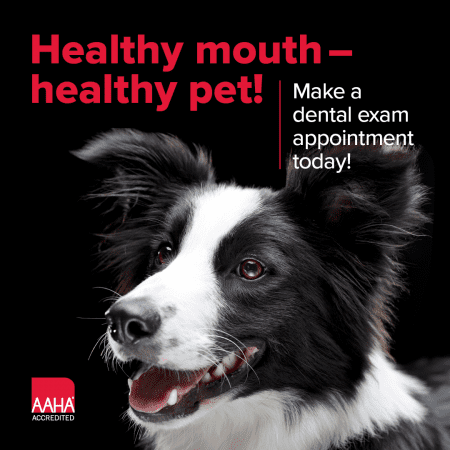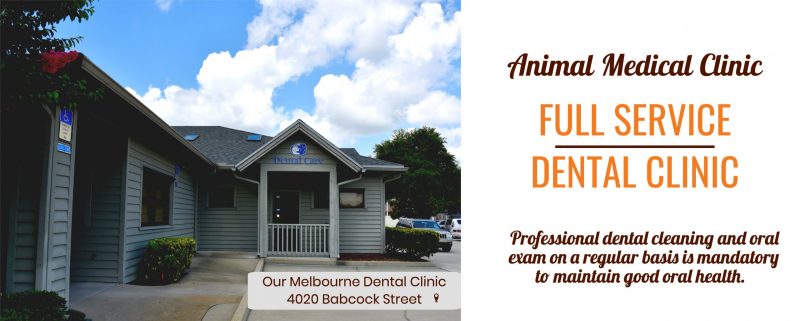Dental health is an incredibly important part of your pet’s overall well-being. People are advised to visit the dentist regularly, and our pets should be held to the same standard. From tartar build-up, to tooth fractures, to other painful oral diseases, pets experience dental problems, too. Here are the top five reasons why you should schedule your pet for her routine dental exam and cleaning.
1 – Dental disease is one of the most common diseases in pets
Many pet owners are shocked to learn that their pets need their teeth professionally cleaned. Unlike people, pets rarely smile or flash their pearly whites, so dental problems often go unnoticed until their veterinarian sees what is going on 
Approximately 80% of pets over age 3 have varying degrees of active periodontal disease, a condition characterized by inflammation or infection of the supporting dental tissues, like the gingiva (gums). Initially, bacteria and food particles form plaque on the tooth, which can be removed with regular at-home oral care. Within several days, however, the plaque becomes mineralized tartar. When tartar builds up beneath the gum line, periodontal disease occurs, which can lead to serious oral problems. Tartar can be removed only with a professional dental scaler and must be performed under anesthesia for thoroughness and for your pet’s safety and comfort.
2 – Preventing dental disease is more cost-effective than treatment
When we delay professional dental cleanings for our pets, oral bacteria proliferate, causing periodontal disease, leading to infection in the gums and bone loss around the teeth, often requiring an expensive tooth extraction, root canal, or other advanced procedure. However, when pets receive thorough, routine dental care regularly, such problems can be avoided, making periodontal disease completely preventable.
3 – Dental disease is painful for pets
Pets are stoic creatures who readily hide pain and discomfort. For this reason, many pet owners are oblivious to their pet’s active dental disease. Many pets, including those with advanced disease, will eagerly eat their meals and go about their day as if nothing is wrong, while others may show subtle or obvious signs of discomfort. Look for the following signs that may indicate your pet is in pain:
- Refusal or hesitation to eat or drink
- Preference for softer foods
- Taking more time to eat
- Abnormal chewing
- Dropping food from the mouth
- Bleeding from the mouth
- Pain on touching the mouth
- Swelling of any areas near the mouth
- Hissing or growling while eating
- Becoming aggressive or less social to the family
4 – Dental disease can lead to other health problems
Untreated dental disease can lead to oral bacteria spreading into the bloodstream. This harmful bacteria can reach other organs, such as the heart, liver, or kidneys, and cause serious illness and decreased vitality. Maintaining a healthy mouth can help prevent other problems.
5 – Most pets don’t receive adequate at-home oral care
A regular oral hygiene routine should be a mainstay of your pet’s care, like frequent groomings, nail trims, and veterinary care. Some common methods and products include:
- Tooth brushing with a veterinary enzymatic toothpaste
- Oral sprays and rinses
- Anti-plaque water additives
- Topical dental wipes
- Dental rawhide chews
- Dental diets
Your AMC veterinary team can guide you on specific recommendations for your pet. Ask us next time you’re in.
